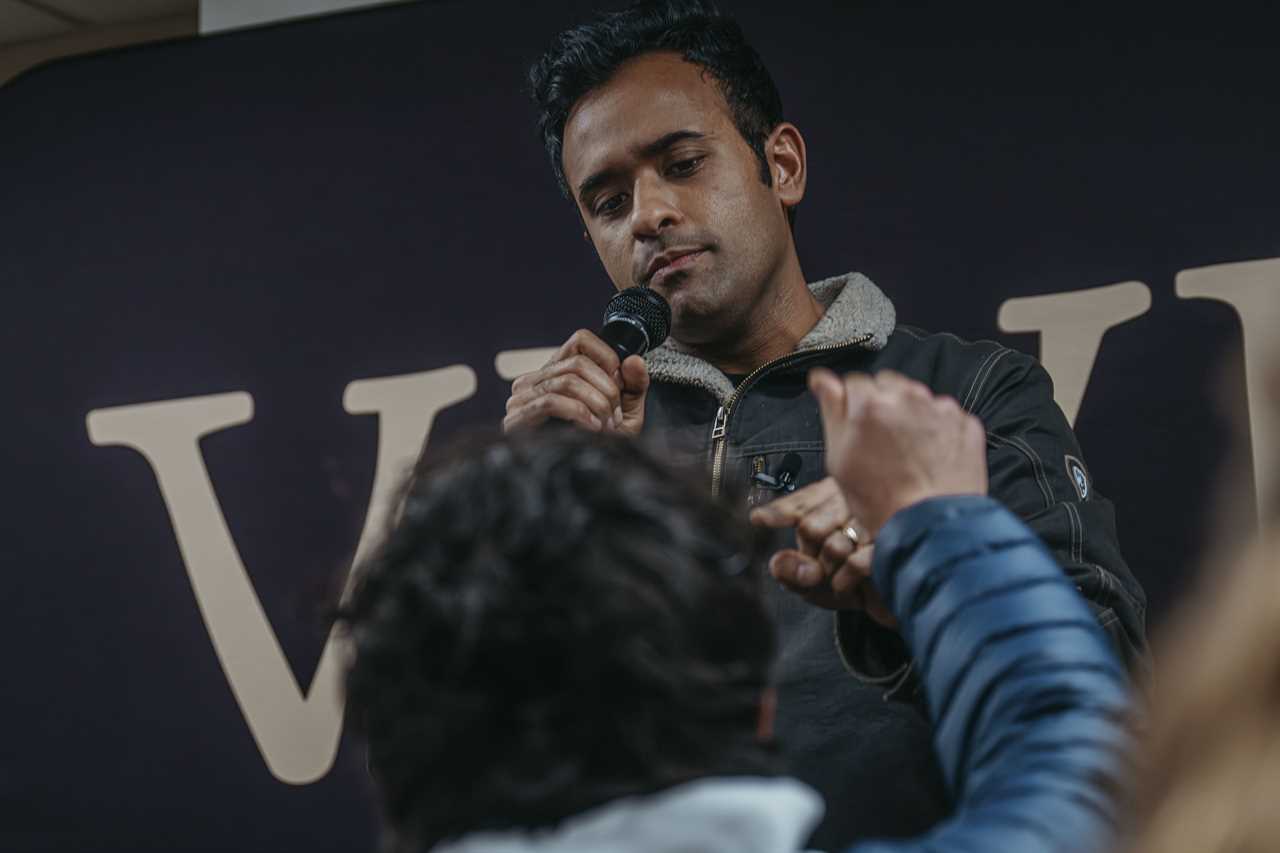
DES MOINES, Iowa — “You embarrassed me,” the woman told Vivek Ramaswamy after she stood up before the crowd.
The words offered the promise of some friction at an event — a town hall hosted by the Ramaswamy campaign less than two weeks before the Iowa caucuses — that was otherwise short on dramatic tension. Former President Donald Trump, after all, has maintained a commanding lead in the state while Ramaswamy has been mired in single digits in the polls; he lags far behind even the distant second-tier candidates, Florida Gov. Ron DeSantis and Ramaswamy’s improbable arch-nemesis, former U.N. Ambassador Nikki Haley.
The woman who stood up hastened to add that she and her partner were actually Ramaswamy supporters, but she had been bothered by the tone of his remarks weeks earlier toward Van Jones. The CNN political commentator had sharply criticized Ramaswamy’s performance at a primary debate, and in response, Ramaswamy publicly suggested that he “just shut the fuck up.”
“What’s your strategy for maintaining decorum?” the woman politely asked in a half-empty airport hotel conference room. The 38-year-old entrepreneur and political novice had heard this before — he was a fighter, he responded, and would not sit by while others attacked him — but here, in a nutshell, was the central paradox of the Ramaswamy campaign.
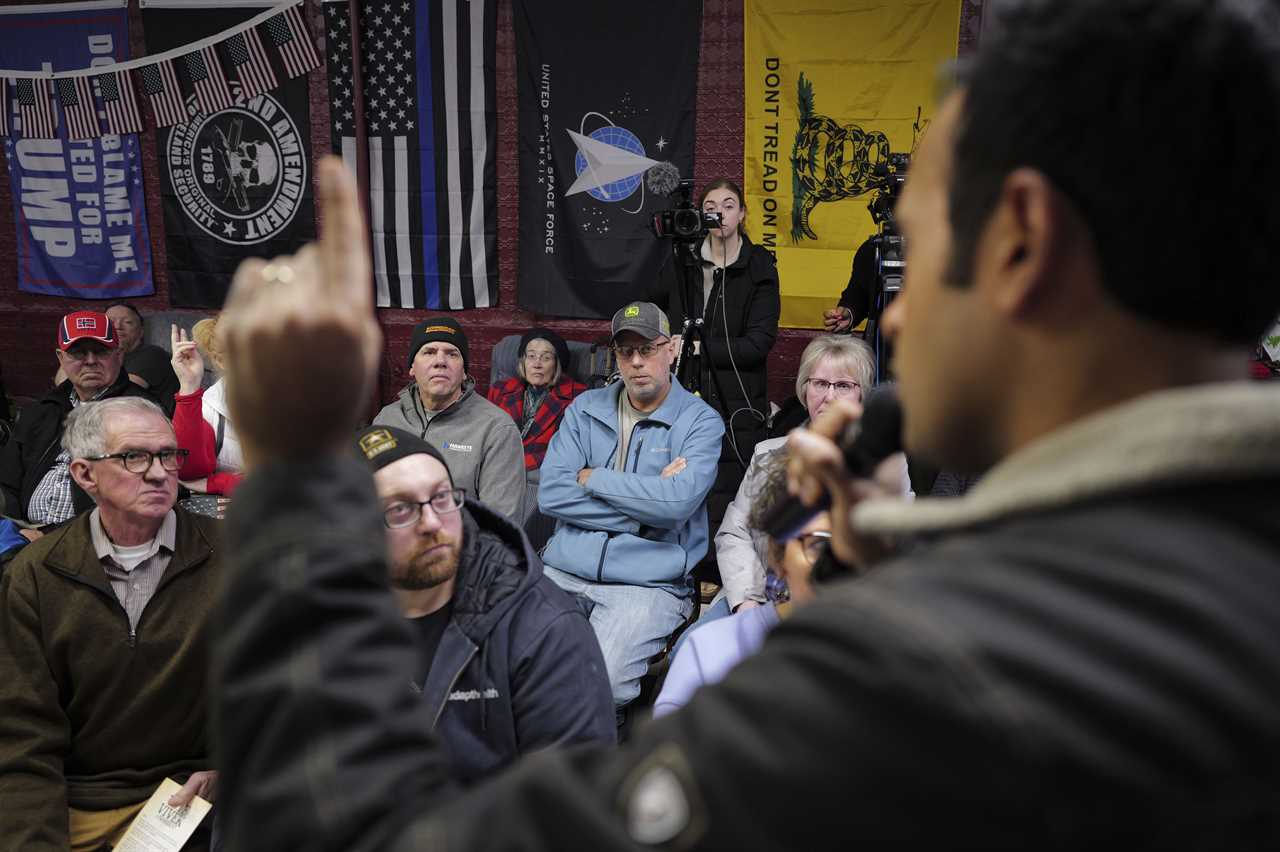
Ramaswamy’s mouth — his ability to prod, to provoke, and often to enrage — has been both his greatest asset and his greatest liability over the course of a year of campaigning. He has sought to position himself as the heir to Trump’s MAGA movement in countless media appearances in which he has thrived on controversy and attention, and he even had a bit of a moment after the first GOP primary debate, when his performance prompted a flurry of interest on the part of people watching at home.
But things seemed to turn sour as Republicans saw more of him. He was voluble, combative and eager for attention, no matter what kind — whether it came from talking about his “ten truths,” gratuitously insulting Haley’s intelligence or mocking former New Jersey Gov. Chris Christie over his physical appearance. Ramaswamy also adopted a hard-right, libertarian-leaning agenda, along with an increasing embrace of wild conspiracy theories; by the end of the campaign, this graduate of Harvard and Yale, who has styled himself as an anti-elitist, was expressing doubts about the official government accounts of what happened on 9/11 and Jan. 6.
At campaign stops, Ramaswamy stands in front of a large sign that says “TRUTH.” But the unofficial campaign slogan might as well be “Say Anything.”
There is little question that the campaign has made him more widely known throughout the country, but on the eve of the Iowa caucuses on Jan. 15, as we enter the key stretch of the 2024 primary season, it is far from clear what it all adds up to — or where Ramaswamy goes next if, as the polls suggest, he falls far short of winning the Republican nomination.
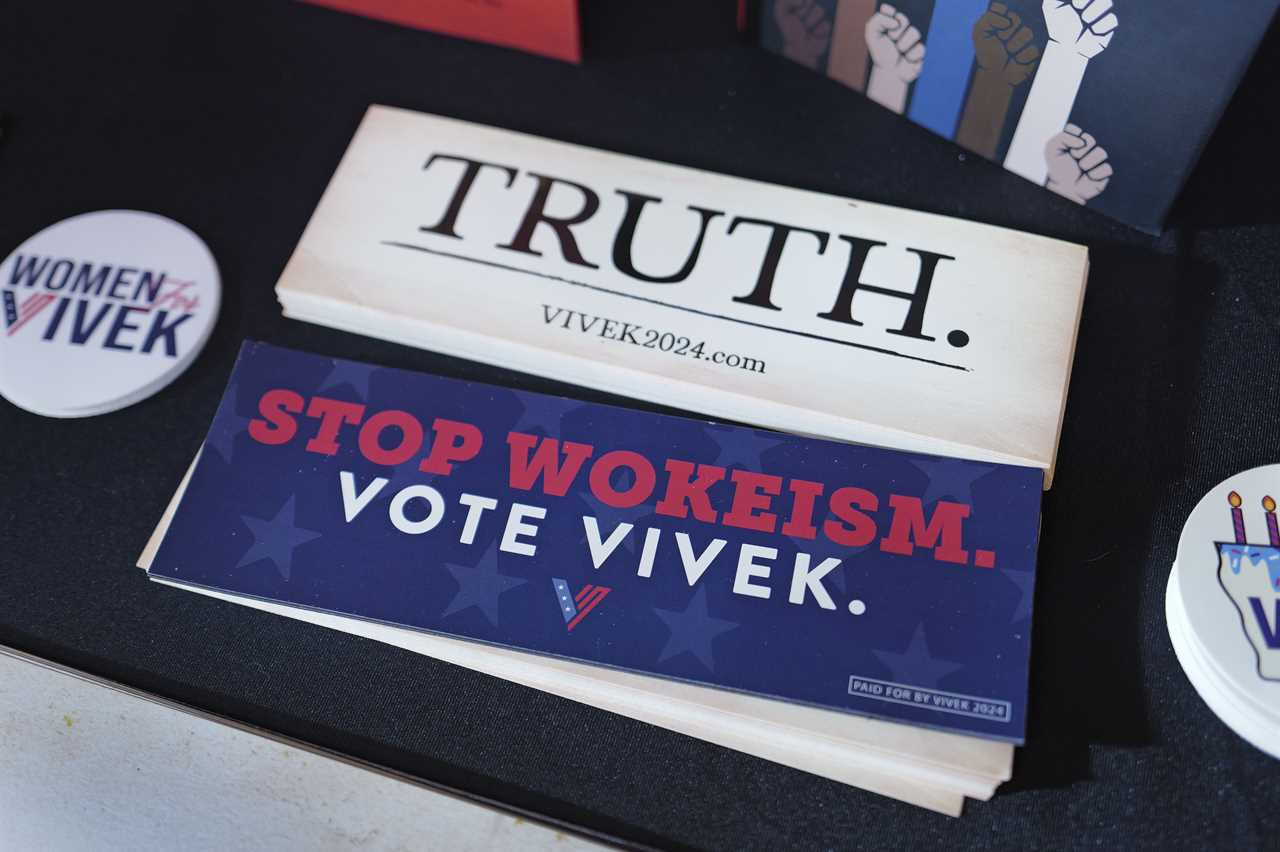
A year ago, Ramaswamy was best known in niche conservative circles as the guy who railed against the “woke left” and political censorship on conservative television and in op-eds. He is now a regular on the television news circuit and has since appeared in every crevice of the national political media — often producing outrage-inducing exchanges that he then parlays into more media coverage.
For months, the line on Ramaswamy among many political insiders is that this has all been a cynical bid for national media attention and public prominence, perhaps with an eye toward a show on Fox News or some independent conservative media platform when all is said and done. He already has his own podcast.
As we traveled on his bus between campaign stops, Ramaswamy batted away speculation that he would end up working in the media. “I’m not a plan B person,” he said during an interview. “I think we’re in this to revive this country, and I have my sense of duty to this country. I believe we’re going to do it.”
Okay, I said, but “what happens if you lose?” I posed all sorts of possibilities. Ramaswamy has been flagrant in his Trump sycophancy, the latest being his submission of a Supreme Court amicus brief arguing Trump shouldn’t be disqualified from the presidency for his Jan. 6 conduct. Would he be Trump’s running mate? Would he accept a cabinet position in a second Trump administration? Would he accept any government position in any Republican administration?
“I’m not a planning person,” he said. “I don’t do the bifurcated flowchart.”
He gamely insisted that he was headed toward, if not an outright victory, a finish that defies the persistently grim poll numbers.
“I think we’re going to see a shock on Jan. 15,” he told me. “I think whatever those media expectations and the polling expectations that have been set, I think we’re going to shatter them.”

On the ground in Iowa, the signs were not promising.
The day before the event that I attended in Des Moines, Ramaswamy had failed to qualify for a Republican presidential primary debate in Iowa hosted by CNN that would air the following week with just Haley and DeSantis on stage. The slight prompted a predictably colorful attack from the candidate, who described the network as a “[r]atings wasteland” that had “exposed itself to be actively engaging in egregious interference with the Iowa GOP caucus and disrespecting GOP voters.”
A week earlier, news broke that the campaign had stopped its television ad spending. That prompted speculation from a writer for MSNBC that Ramaswamy might be “quiet quitting” his campaign. (The campaign insisted that it was shifting its spending to more effective forms of voter outreach.)
The energy at Ramaswamy’s events also seemed slightly off. Many attendees seemed less interested in figuring out whether to support Ramaswamy in the caucuses than they were in seeing a show — a curiosity, if not exactly a spectacle — or perhaps simply getting an opportunity to publicly vent frustrations with the government and the media in front of a sympathetic audience. There was also free food.

During the Q&A portion of the event at the Des Moines hotel, a different woman offered a convoluted and disturbing story about a hospital worker who had taken her child from her over a year ago after suspecting physical abuse that, in her telling, had not occurred. She complained about mandatory reporter laws, but it was far from clear what had actually happened or who was really at fault.
A man asked whether Ramaswamy would order pharmaceutical companies to “pull” their Covid-19 vaccines from the market if elected and went on to criticize the media for not telling children that they could refuse to get the vaccine under informed-consent laws. It was not immediately clear whether either of them actually planned to caucus for Ramaswamy. The candidate ably mollified them — in response to the woman, he correctly noted that mandatory reporter laws are generally matters of state law before proceeding to criticize government bureaucrats — and moved on.
Ramaswamy has also sought to position himself as the face of a new generation of Republican voters who can modernize the party, but the attendees themselves did not seem to bear this out. The people who showed up were almost all middle-aged or older. Some had brought kids, who appeared generally respectful but bored, at least until the pizza showed up.
Even the media presence seemed to reflect the awkward, slightly listless atmosphere. There were a handful of camera operators in the back with television networks and a local reporter or two, but by now, they were all familiar with how these events went. Some told me that they had at times been privately offended by Ramaswamy’s seemingly endless provocations, but now largely shrugged them off. The campaign embeds were counting the days to the caucuses so that they could get some time off and return to their homes. They did not seem to expect the Ramaswamy campaign to last much longer after Iowa.
And for all his talents as a right-wing media provocateur, it was not clear whether any conservative media cared to show up for the day’s events.
Tommy Vietor — the former Obama campaign and White House alum who co-founded the liberal podcast company Crooked Media — was off to the side with a couple of colleagues and some recording equipment. They were working on a short series about the Iowa caucuses and making the rounds among Republican candidates’ events in the state that week. They were not exactly there to help spread the campaign’s message.
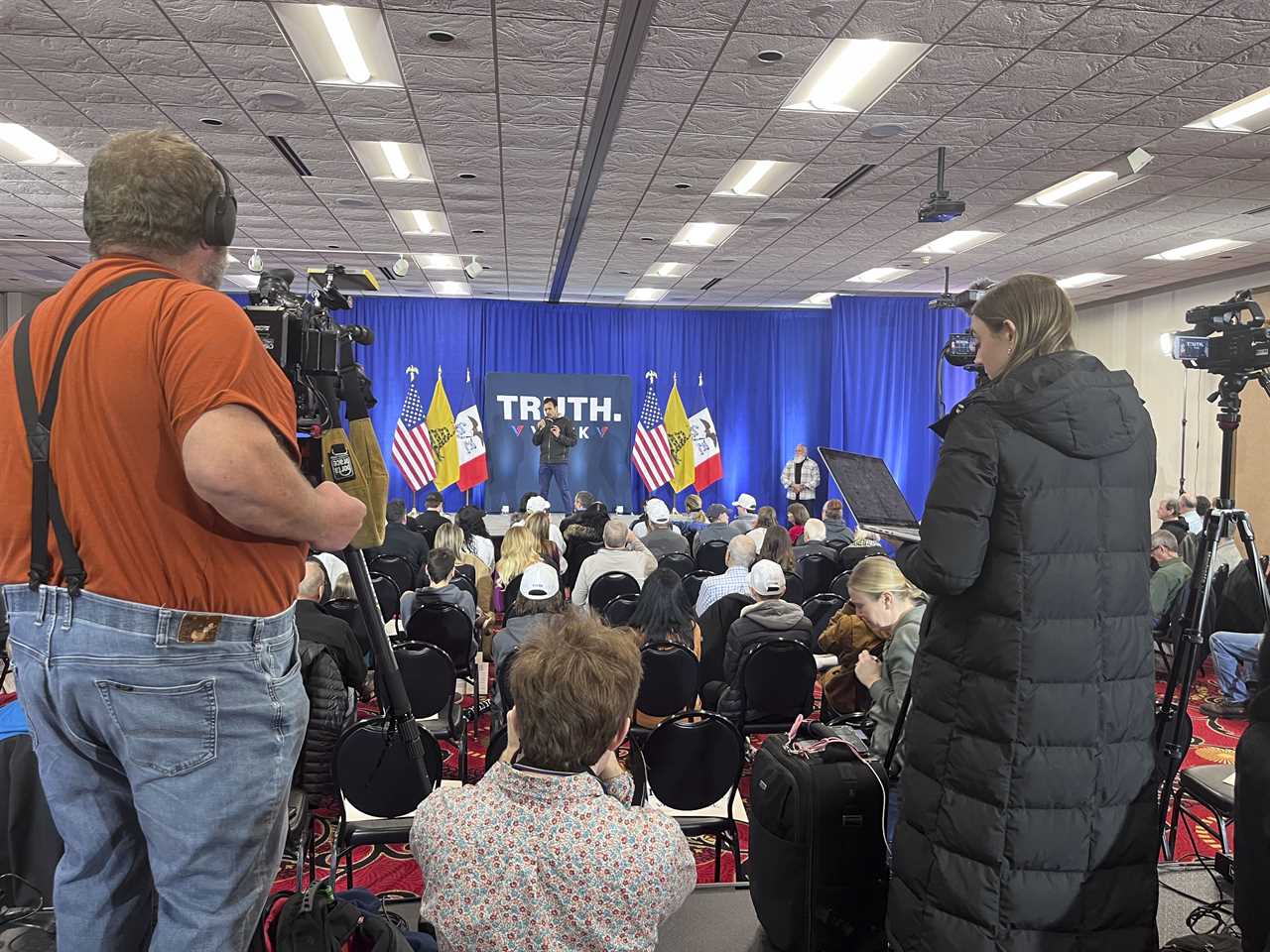
When I sat down with Ramaswamy on his bus after the second event of the day, he was polite, lively and affable — a far cry from the figure he had cut on the debate stages — but even as we spoke, we seemed to be circling a very large drain.
I told him that I had been interested in his rise in part because, like him, I am the son of Indian immigrants who grew up in the Midwest. Indian-Americans have been gaining political influence for years, with both parties seeking to make inroads with them, but as a group, they still skew largely Democratic, making Ramaswamy’s profile itself a bit of an anomaly. Still, along with Vice President Kamala Harris and Haley, Ramaswamy is now — for the moment, at least — one of the most politically prominent and potentially influential Indian-Americans in the country.
I asked Ramaswamy whether his and Haley’s shared heritage might have had anything to do with the sharpness of their public exchanges. In a little-noticed incident, Ramaswamy had at one point last year referred to Haley as Nimarata Randhawa — her given first name and her maiden name — which some people took as a possible swipe at Haley for obscuring her ethnic background in order to attract support from conservative white voters in the party. The charge has long trailed her, particularly among Indian-Americans. (“Nikki is my name on my birth certificate,” Haley once explained in a tweet. “I married a Haley. I was born Nimarata Nikki Randhawa and married Michael Haley.”)
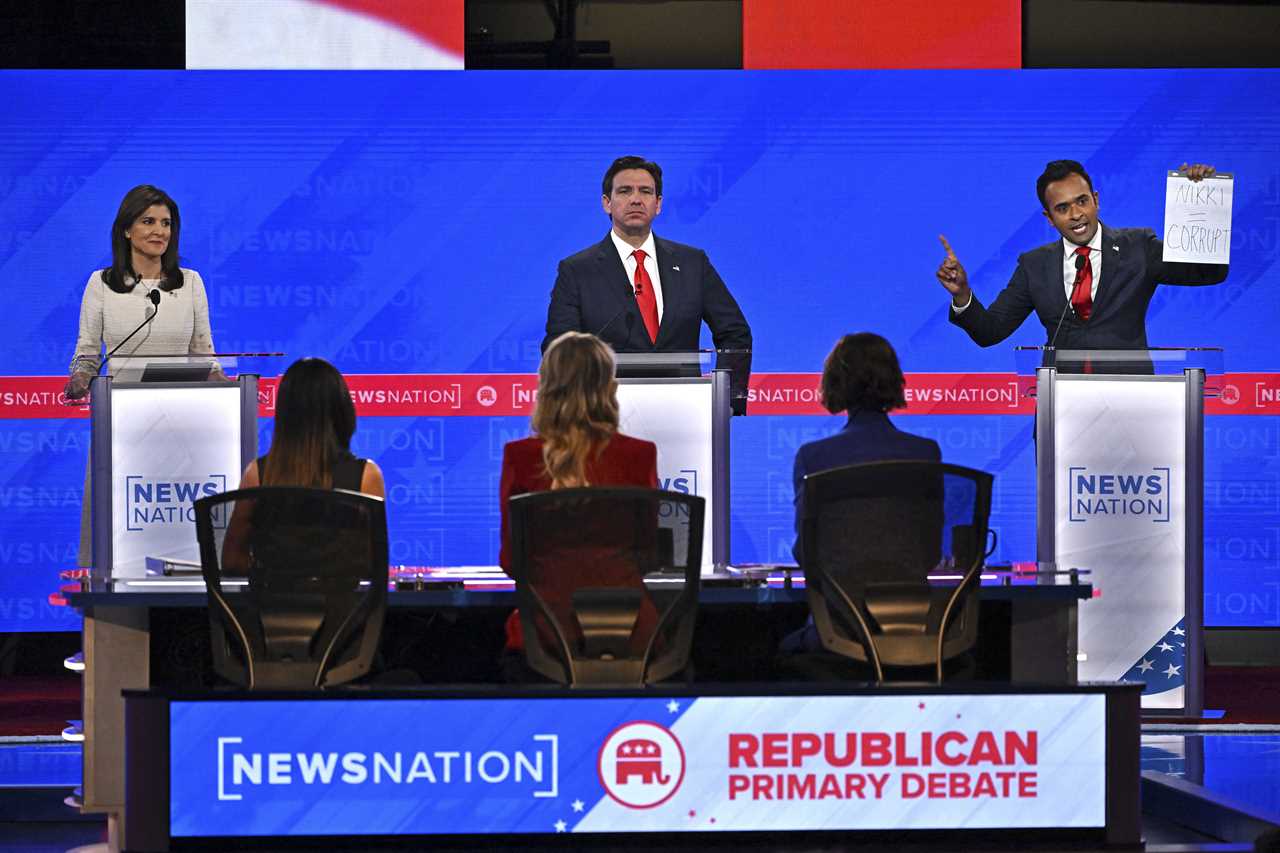
Considering that Ramaswamy is a self-styled “anti-woke” candidate, this had struck me as a very strange and surprisingly overt use of identity politics — a potentially novel one, too. Ramaswamy was not attacking Haley for being a minority in the Republican Party; he seemed to be criticizing her for being insecure about it.
Ramaswamy was not interested in exploring the episode when we spoke — he quickly went on to lacerate Haley for being “the face of corruption in American politics” — but there seemed to be something slightly personal lingering underneath it all.
“She of all the people in this race,” he said offhandedly, “has had the most trouble pronouncing my name properly, which I thought was a little bit ironic.”
I also half-jokingly raised the possibility of him serving as UN ambassador if he fell short of the nomination — the position that Haley once held — as a way of furthering and maybe even ultimately winning his feud with her, but Ramaswamy did not budge.
“I have an inconvenient thing called independent opinions,” he told me, suggesting that the “TRUTH” might be too much even for the party’s eventual presidential nominee.
I later asked him to explain to me what exactly he believed had occurred on Jan. 6, 2021, when Trump supporters overran the U.S. Capitol in a last-ditch effort to prevent the certification of Biden’s 2020 election victory. Ramaswamy had repeatedly come under attack during the campaign for claiming that the siege of the Capitol was, as he eventually put it at his last debate, “an inside job.”
What followed as we spoke was less than illuminating.
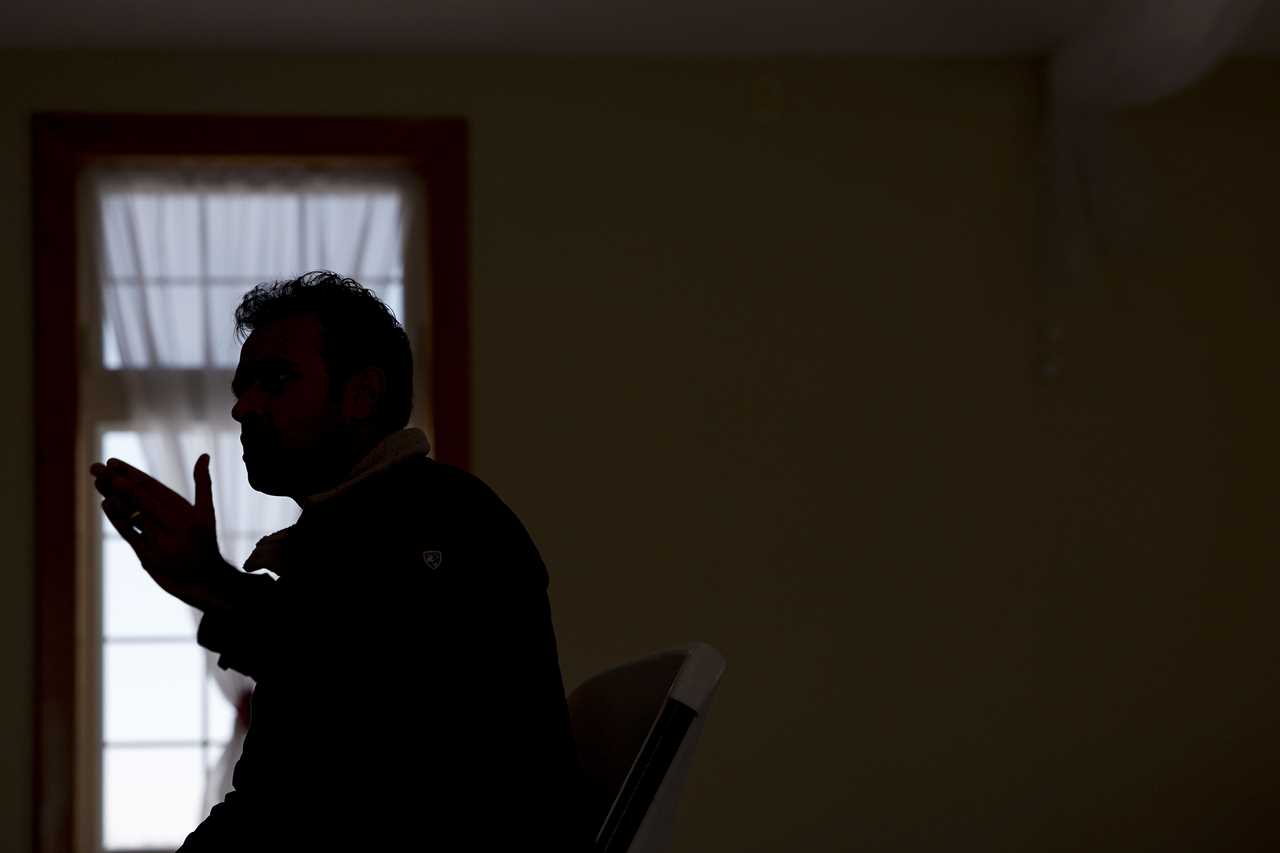
“I think that the government hasn’t told us the truth, the entirety of what happened on Jan. 6, and I think we deserve to know,” he said. “Answer openly: How many FBI informants and how many federal agents were in the field? Answer openly what the video footage was. Just release all the video footage. Why selectively release some video footage but not others? I think that that breeds distrust.”
He went on in this vein — eventually denouncing “the deep state,” arguing that we should dismantle the FBI — but it was all just as vague and airy. He suggested that the people present had been entrapped, citing the FBI’s conduct in connection with a plot to kidnap Michigan Gov. Gretchen Whitmer, but the comparison was plainly silly.
About 140 people have been convicted of federal charges at trials in connection with the siege of the Capitol. Over 700 people have pleaded guilty to various charges, including more than 200 people who admitted to committing felonies like assaulting police officers.
Did hundreds of people really plead guilty in open court after being entrapped by the government?
“Well,” Ramaswamy said, “I think hundreds of people pled guilty under false circumstances” as a result of “Brady rule violations that otherwise could have been corrected.”
The goalposts had immediately shifted in very Ramaswamy-like fashion; in fact, we were on an entirely different field. We were no longer talking about the unprecedented and absurd government entrapment scheme that he had casually floated. We were now talking about alleged discovery violations on the part of the prosecutors. I was on the verge of a headache.
Brady rule","link":{"target":"NEW","attributes":[],"url":"https://www.law.cornell.edu/wex/brady_rule","_id":"0000018d-07ea-d4f1-a18d-7ffeb8470004","_type":"33ac701a-72c1-316a-a3a5-13918cf384df"},"_id":"0000018d-07ea-d4f1-a18d-7ffeb8470005","_type":"02ec1f82-5e56-3b8c-af6e-6fc7c8772266"}">The so-called Brady rule requires prosecutors to disclose exculpatory evidence in their possession to criminal defendants, but Ramaswamy suggested that prosecutors had violated this rule because they did not produce the full cache of video from the Capitol police to all of the Jan. 6 defendants.
I told him that as a former federal prosecutor, I had some familiarity with the disclosure obligations under the law and that, even as he described it, the argument seemed plainly wrong as a legal matter. The Capitol police are a part of the legislative branch, not the executive branch, and in any event, there is no real reason to believe that the video is actually exculpatory given the nature of the charges.
“Whether you believe that as a legal matter or at least as a moral belief —” he began.
“It’s not a belief,” I interjected.
Perhaps sensing the conversation was getting away from him, Ramaswamy then tried to convince me that we were actually not that far apart in our views. “I share your opinion,” he then began to say.
“You don’t share” it, I told him. “You’re wrong about the law.”
“I think the Supreme Court [would] agree with me 6-3 on this,” he said.
“That’s an imaginary case,” I explained. “The law currently — you are wrong about.”
“Well, I think that the Jan. 6 defendants should bring this case,” he responded. “I think it should find its way all the way to the Supreme Court, which is why I’m bringing it up.” In fact, multiple Jan. 6 defendants have made this argument; no judge has agreed. Within seconds, we had begun talking over one another.
The exchange was not hostile but hollow. I happened to know something about the subject. He did not, but he also did not care. He had made up his mind — or, at least, was committed to the bit.
We had, in an instant, encountered one of the fundamental problems with Ramaswamy’s campaign pitch. He has said that he wants to promote a culture of open dialogue and debate that has supposedly been lost in American society, that he wants “TRUTH.” And he is right that the two things are linked in political thought: A culture of free expression and debate is supposed to facilitate the discovery of truths — even, and perhaps most importantly, uncomfortable ones.
But heated discussions and obnoxious debates are not, by themselves, guarantors of truth. Someone at some point in the discussion has to actually know what they are talking about, and the participants have to be both honest and willing to change their minds. If those conditions are not met, all you are left with is a formula for endless argument and outrage.
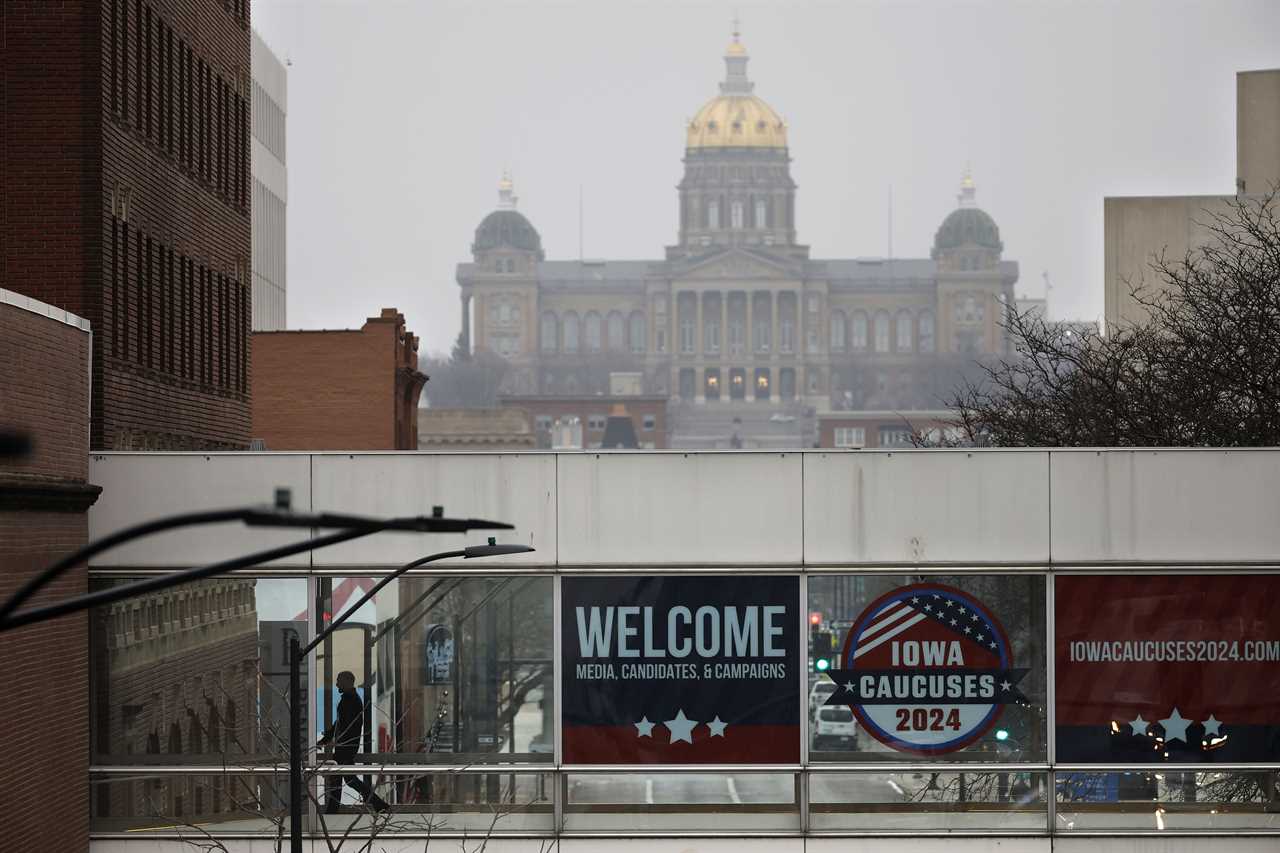
The same slight current of disinterest detectable in the morning ran through the Ramaswamy campaign events that I saw later in the day. The attendees were modestly attentive and engaged, but no one was oblivious to Ramaswamy’s standing in the campaign or his odds of pulling off some sort of grand, expectation-defying result.
In the afternoon, as Ramaswamy wrapped up a Q&A session at a restaurant about an hour outside of Des Moines, a local Republican Party official stood up and urged everyone to caucus even if they did not support Ramaswamy. The most important thing, she said, was to join forces to defeat Joe Biden in the fall.
After the event ended, I turned to an older man standing next to me to ask him what he thought. He was impressed with the young candidate but planned to caucus for DeSantis. He added that he would not mind seeing Ramaswamy as a vice presidential nominee or even Cabinet secretary in a future Republican administration.
When I told the man that Ramaswamy had seemed to rule out the possibilities of serving on Trump’s ticket or in his administration, he did not appear to be particularly bothered by the loss.
Assuming Ramaswamy does disappoint in Iowa, it wouldn’t have to be the formal end of his 2024 presidential dreams. He has deep pockets and has largely funded his own campaign, so he could always continue on to New Hampshire and beyond. And at 38, he has plenty of time to run for office in the future — another bid for the White House, perhaps, or if he lowers his sights, a seat in Congress.
The problem is that time does not seem to be helping him. Ramaswamy has dramatically improved his name recognition with Republican voters, but his unfavorable numbers have creeped up alongside his favorability ratings. Meanwhile, among all Americans, Ramaswamy’s net favorability numbers — once modestly positive — have gone decidedly upside down since the fall, as his national exposure has increased. This is not a great strategy for a successful presidential campaign, but it is, perhaps, a decent enough recipe for a viable career in political media in a period of intense political polarization and more freewheeling public debate than ever in recent memory.
The campaign had agreed to take me around with them for the whole day, but as I was getting ready to head to the next event, I found out that our deal was off. Ramaswamy was flying to his next stop, and I was being left behind — without an obvious way to get back to my hotel, which was about 50 miles away.
I could not help but find the whole thing very fitting.
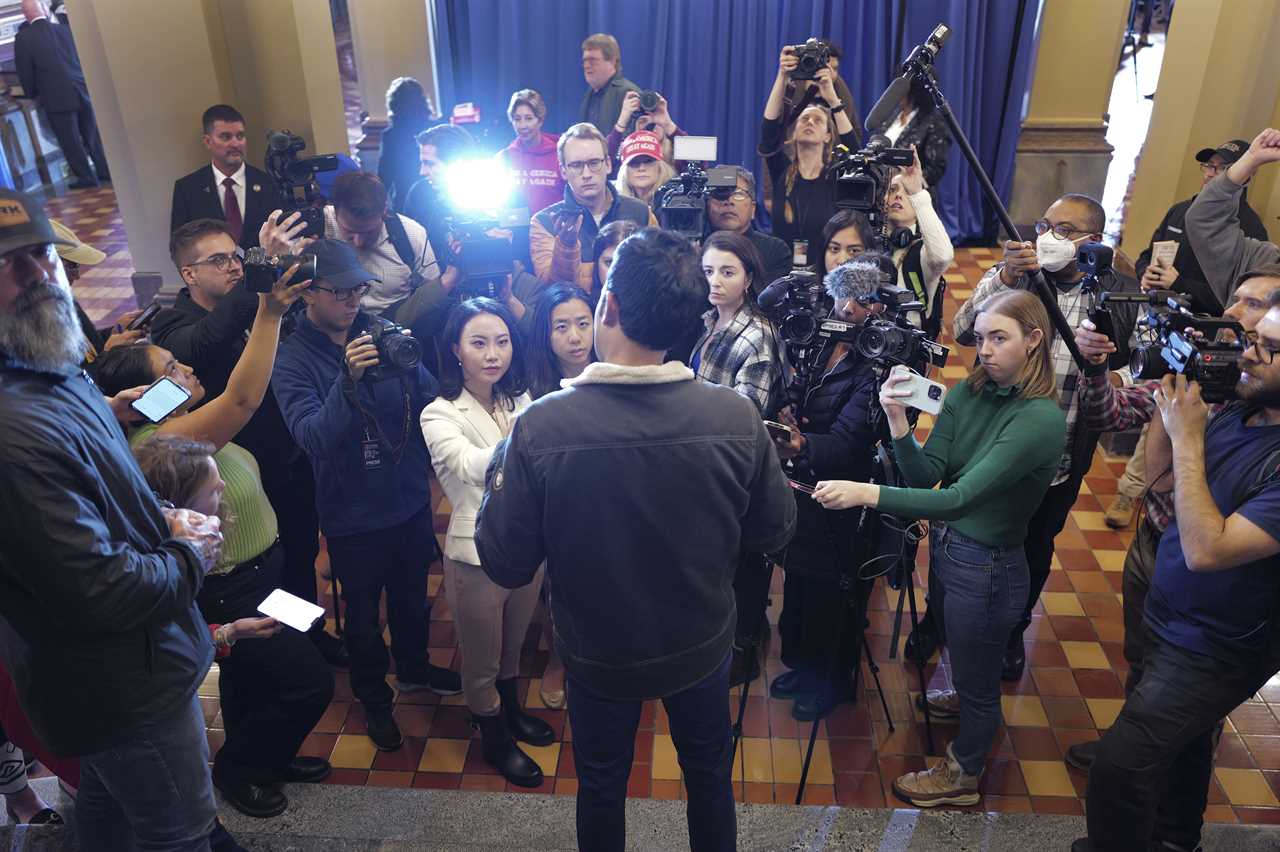
Seen one way, it was perhaps more evidence of Ramaswamy’s mercenary-like relationship with the mainstream press — deeply solicitous, then sharply antagonistic when things do not go his way. But in the moment, it seemed to reveal more about the lumbering quality of a campaign approaching its conclusion.
Fortunately, it was not long before a fellow attendee headed back to Des Moines offered me a ride.
After dinner, alone in my hotel room, I was slightly curious about what I might have been missing. The campaign was live streaming some of its events, including the last event of the day, at a venue in Clinton County. I checked in to find Ramaswamy greeting a line of attendees who offered scattered words of support.
An older woman who was evidently there with her husband approached with a big smile, asked for a photo and then, before getting ready to walk off, casually said to Ramaswamy, “We’ll give you our vote if you’re the nominee.”
“I appreciate it,” Ramaswamy said, not immediately processing what she had said. When he did, he quickly added, “Well, I’m asking for it on Jan. 15.”
He then tried to persuade the woman that if she voted for Trump, she would simply be falling for an elaborate political scheme perpetrated by the political establishment and the media.
“I don’t want you to fall for the trick,” Ramaswamy told her. “They’ve laid a trap. Do you think they’re gonna let this man…? They’re not gonna let this man…” He gripped her hand as he spoke and looked at her directly.
“Win” was the word he seems to have left unsaid, but what was he hinting at? That Trump’s opponents would imprison him to prevent him from taking office? Assassinate him? It was yet another vague and unhelpful provocation — one that also failed to offer any actual critique of the frontrunner he has in theory been trying to overtake.
The woman did not seem to know exactly what Ramaswamy meant, but she also did not seem particularly interested. After she got her picture, she walked off.
----------------------------------------
By: Ankush Khardori
Title: Vivek Ramaswamy’s Wobbly Last Stand
Sourced From: www.politico.com/news/magazine/2024/01/14/vivek-ramaswamy-last-stand-iowa-00135400
Published Date: Sun, 14 Jan 2024 07:00:00 EST






